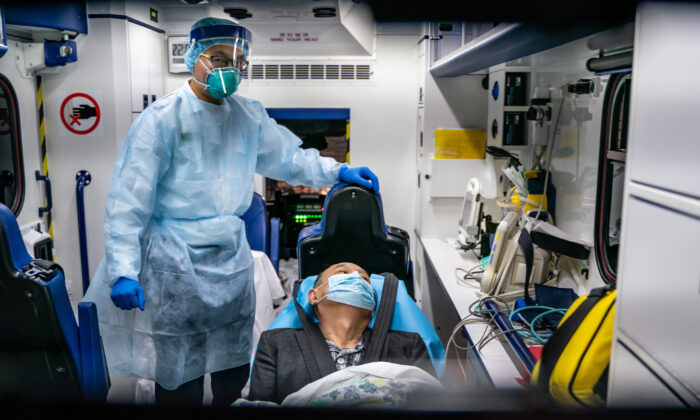Impeachment Trial Live Updates: GOP Senators Suggest Witnesses
The day after Zhong Nanshan, lead scientist in China’s National Health Commission, announced that the new coronavirus from Wuhan pneumonia patients was confirmed to spread by human-to-human contact, he revealed that 14 medical personnel in one hospital had been infected while treating one patient.
Chinese state media finally revealed the details on Jan. 25.
Zhao Junshi, 69, underwent surgery to remove a pituitary tumor at Wuhan Union Hospital’s neurosurgery department on Jan. 7. No one was aware that he had Wuhan pneumonia.
On Jan. 11, he suddenly developed a fever. CT scanning indicated infection in both lungs. The doctor in charge immediately reported Zhao’s case to the contagious diseases department, asking experts from the department to help diagnose the cause of the illness.
Doctors concluded that Zhao was infected with “an unknown type of pneumonia.” There was no kit to test for Wuhan pneumonia yet.
The next day, Zhao’s condition became very serious. His chest scan showed “multiple lung shadows.” Then, some of the medical personnel taking care of him developed a fever, one after another. That’s when Zhao was put in an isolation ward.
On Jan. 15, Zhao was confirmed to be infected with the new coronavirus, and transferred to Wuhan’s Jinyintan Hospital, a contagious diseases facility.
The affected medical staff were also sent to Union Hospital for isolation and treatment.
However, when Wuhan Health Commission issued a routine update about Wuhan pneumonia on the evening of Jan. 16, it didn’t mention that medical staff had been infected.
It wasn’t until Jan. 20 that Zhong Nanshan admitted for the first time at a press conference that the virus can spread from human to human.
The Cover-Up
Lin Yu, a doctor at Wuhan Union Hospital, recalled that shortly after the first group of patients with Wuhan pneumonia were identified, local authorities insisted that hospital staff not reveal any information on social media or accept media interviews.
“Basically, we were forbidden to reveal any information,” Lin said.
“There was only one thing that we could do—we told our patients, ‘be sure to purchase a mask and wear it when you go out.’ We also told them, ‘Do not shop at Huanan Seafood Market. The food sold there is not fresh.”
Huanan Seafood Market sells fish, shellfish, and exotic wild animals. Among the first group of Wuhan pneumonia patients, a significant percentage either worked at the market or were regular customers of the market.
In addition, Lin noticed that before Jan. 20, only a few people in Wuhan were wearing masks. He asked an employee at a Wuhan subway station: “Did you know that it’s good to wear a mask? Why don’t you wear it?” The person replied, “Our supervisors forbade us to wear it, so as not to cause panic.”
“That sent a chill to my heart,” Lin said. “If the authorities had disclosed the information explicitly, 50 to 60 percent of people would have taken precautions.”
The Super Spreader
Some patients are more infectious than others who have the same disease. This group of people is called super-spreaders, and are a crucial factor in the accelerated spread of a contagious disease.
The patient in Wuhan who infected 14 medical staff could well be a super spreader.
During the 2003 SARS outbreak, a Chinese doctor at the Second Affiliated Hospital of Sun Yat-Sen University went to Hong Kong as a tourist. He stayed in the Metropark Hotel Kowloon for one night. Sixteen hotel guests from different countries, including Vietnam, Singapore, and Canada, were infected with SARS from this doctor, and they in turn carried the virus back to their home countries. World Health Organization later confirmed that in Singapore alone, the source of the SARS infection of 94 patients can be traced to the Metropark Hotel.
The scientific community suspects that the super spreaders can carry mutated versions of the virus, or a higher viral load because the virus multiplies more quickly in their bodies due to a weakened immune system.
As no one knows who will be a super spreader, there is no way to prevent the emergence of new super-spreaders.
This article is from the Internet:Details About the First Known Super Spreader of Wuhan Pneumonia
China Now Second Largest Weapons Producer in World: Arms Watchdog
